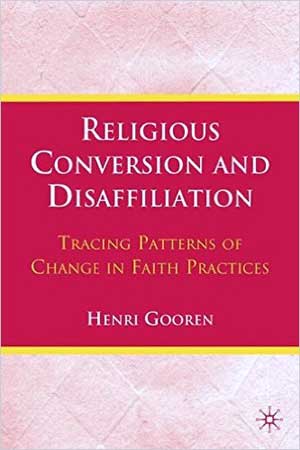
Victor Reppert: Let the conversions and deconversions fall where they may.
Edʼs Response: We know where the conversions fall, statistically speaking, which tells us that the continuance of Evangelical Christianity depends heavily on adolescents who “accept Christ” before they reach the age of 18. And adolescents do not know much about the Bible, history, science, psychology or religion; they are far from having peaked in their acquisition of worldly wisdom; and they are not known for their emotional maturity. Therefore, we have reason to doubt that such “decisions for Christ” are well informed. Yet Evangelical Christianity relies heavily on such decisions in order to continue at all.
Below is the statistical data, shared from articles that appeared in Christianity Today:
“85 percent of all people who accept Christ do so before the age of 18.”
“…through surveys, personal interviews, and statistical analysis, I compared the faith experiences of more than 3,000 believers from 31 states and a dozen denominations.”
“84.5 percent of evangelicals accept Christ before the age of 18. However, the statistic only holds true if they were raised in a home where both parents were [Evangelical] Christians with either a high or moderate level of spiritual activity. If, however, they were raised without that benefit, the percentage drops by two-thirds.
“My final discovery was that, of those Christians with an unchurched background, most (56 percent) report coming to faith in the midst of a significant transition or crisis. Most often itʼs family-related—either transitioning into parenthood or coping with a marriage crisis. But other times the crisis may relate to addiction, illness, death, finances, even world catastrophes. The transition may be into a new relationship, a new community, or a new career.”
How Outsiders Find Faith: What I discovered was different from what I had always been told. By Mike Fleischmann (Christianity Todayʼs website)
“In the late 1800s, Edwin Starbuck conducted ground-breaking studies on conversion to Christianity. Ever since then, scholars, attempting either to verify or disprove his findings, have repeatedly demonstrated them to be accurate. Most observers agree that what Starbuck observed is to a large extent still valid. From these studies we learn two significant things: the age at which conversion to Christianity most often occurs, and the motivational factors involved in conversion. Starbuck noted that the average age of a person experiencing a religious conversion was 15.6 years. Other studies have produced similar results; as recently as 1979, Virgil Gillespie wrote that the average age of conversion in America is 16 years.
Starbuck listed “Eight Primary Motivating Factors”:
- fears
- other self-regarding motives,
- altruistic motives,
- following out a moral ideal,
- remorse for and conviction of sin,
- response to teaching,
- example and imitation, and
- urging and social pressure.
“Recent studies reveal that people still become Christians mainly for these same reasons.
“What conclusions can be drawn from this information? First, the average age of conversion is quite young. Postadolescent persons do not seem to find Christianity as attractive as do persons in their teens. Indeed, for every year the non-Christian grows older than 25, the odds increase exponentially against his or her ever becoming a Christian.
“Second, the reasons people become Christians appear to have at least as much to do with sociological factors as with purely ‘religious’ factors (for example, conviction of sin).”
The Adult Gospel: The average convert to Islam is 31 years old. Why does Christianity attract mostly teens? By Larry Poston (Christianity Todayʼs Website)


I think the implication in your post is that teenagers are emotionally volatile and inexperienced and don't have the knowledge to make an informed choice.
ReplyDeleteWhile I think there is some truth in that, I also think that teenagers are at a crossroads in their lives in which they are contemplating their future, their place in the world and the trajectory/path that they should be taking.
I don't think it has mean that teenagers are too stupid to make a choice that means something important to them and guides them toward a life that makes emotional sense to them.
Interesting. Those eight concerns might make a good guide for what issues to focus on in a future book aimed at deconversion.
ReplyDeleteBen
Terri and War on Error,
ReplyDeletePeople gravitate towards or away from beliefs for many reasons (perhaps a better description than "gravitate towards or away" is "become enchanted with or disenchanted with one's beliefs"). Humans are complex creatures.
Sometimes constant study and curiosity play a role. Other times an emotional spark moves one to study something more deeply, a spark due to feeling disappointed, vulnerable, mistreated or fearful, or even a spark due to physical attraction toward someone and a desire to know what they believe.
So far as statistics go, conversions from one end of a belief spectrum to the opposite are the rarest, while conversions to different variations within a particular belief system are far more common (see the book Amazing Conversions from the same publisher that produced Leaving the Fold).
It's also true that children raised in devout Evangelical Christian homes are highly likely to "make a profession of faith" in their teens and then remain Evangelicals the rest of their lives. So statistically speaking, though Evangelicals "say" that their religion is converting people "in their teens," a huge percentage of those kids were raised in pious Evangelical homes.
So once could argue that the "average age of conversion" is actually pre-teenage for most Evangelicals.
And that's probably par for kids raised by pious loving parents of whatever religious belief, not just Evangelicalism.
I don't get it. Is this article saying that if your conversation is through one of these eight motivating factors then that's proof that there is no God? One comment said that each one would give one good tools for de-converting? I don't get it.
ReplyDelete